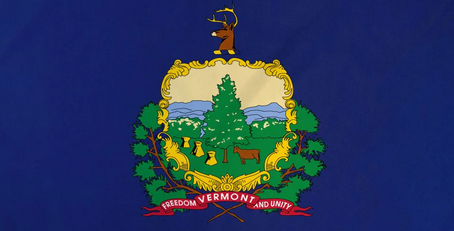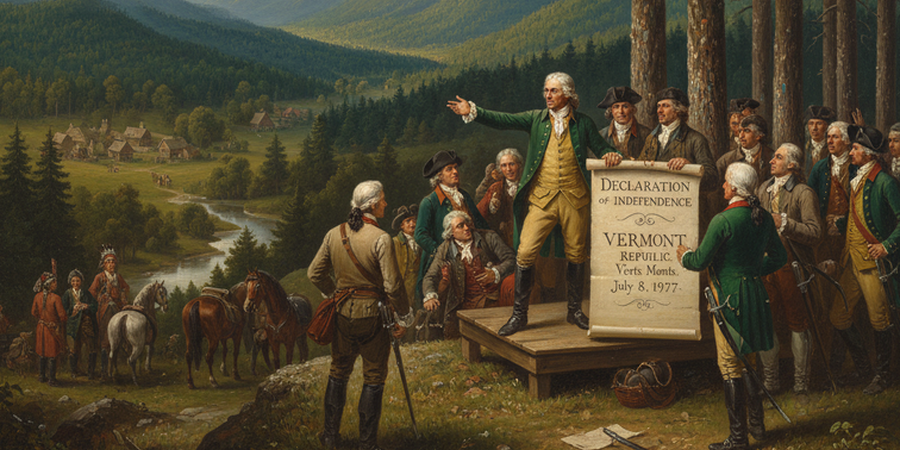VERMONT - The charming "Green Mountain State" holds a unique place in American history, not just for its picturesque landscapes but for its remarkable journey to statehood. Unlike many other states that transitioned directly from colonial territory to state, Vermont spent years existing as a de facto independent entity, carving out its own destiny in defiance of powerful neighboring claims. Before officially joining the United States as the 14th state, Vermont was known by a name that encapsulated its geography, its people's spirit, and its brief but significant period of self-governance: the Vermont Republic.
The New Hampshire Grants: A Contested Beginning
Vermont's pre-statehood story begins with a land dispute that pitted colonial giants against aspiring settlers.
- New Hampshire Grants: In the mid-18th century, the Royal Governor of New Hampshire, Benning Wentworth, began issuing land grants for territory west of the Connecticut River, calling them the "New Hampshire Grants." These grants were eagerly purchased by settlers, many of whom were from Connecticut and Massachusetts, seeking new opportunities.
- New York's Counter-Claim: However, the Province of New York also claimed the same territory, asserting that its eastern boundary extended to the Connecticut River. New York considered the New Hampshire Grants illegal and demanded that settlers repurchase their land from New York or face eviction. This conflict over land titles fueled deep resentment among the settlers.
The Green Mountain Boys and the Fight for Independence
The escalating dispute with New York led to the formation of a local militia and a growing sense of distinct identity among the settlers.
- Ethan Allen and the Green Mountain Boys: Led by charismatic figures like Ethan Allen and his cousins, the Green Mountain Boys emerged as a formidable fighting force, protecting the New Hampshire Grant settlers from New York's attempts to enforce its claims. They became folk heroes, symbolizing the region's fierce independence.
- American Revolution Context: When the American Revolution began in 1775, the Green Mountain Boys famously captured Fort Ticonderoga. While fighting for American independence from Britain, the Vermont settlers also sought to secure their independence from the claims of both New York and New Hampshire.
The Vermont Republic (1777-1791): A Sovereign Nation
Feeling ignored and threatened by both New York's claims and the Continental Congress's reluctance to intervene on their behalf, the settlers took a monumental step towards self-determination.
- Declaration of Independence (1777): On January 15, 1777, representatives of the New Hampshire Grants declared their independence from Great Britain and, crucially, from New York. They initially named their territory "New Connecticut."
- Renaming to Vermont (July 1777): Later that year, on July 8, 1777, the delegates adopted a new name: "Vermont." This name was proposed by Dr. Thomas Young, a Philadelphia physician and supporter of the settlers, combining the French words "verts monts," meaning "green mountains" – a fitting tribute to the region's most prominent geographical feature.
- A De Facto Nation: From 1777 until its admission to the Union in 1791, Vermont functioned as an independent, sovereign republic. It had its own constitution (one of the first in North America to outlaw adult slavery and establish universal male suffrage without property qualifications), its own currency, postal service, and even engaged in diplomatic relations with other nations. This period is often referred to as the "Vermont Republic" or the "Republic of Vermont."
Admission to the Union (1791)
After years of complex negotiations and geopolitical maneuvering, particularly concerning the unresolved land claims with New York, Vermont finally joined the United States.
- Resolution of Claims: New York eventually relinquished its claims in exchange for a payment from Vermont.
- 14th State: On March 4, 1791, Vermont was admitted to the Union as the 14th state, balancing the number of free and slave states (Kentucky would enter as a slave state shortly after).
 Before it officially became a U.S. state, the territory now known as Vermont was, for 14 significant years (1777-1791), an independent and self-governing entity known as the Vermont Republic. Initially called "New Connecticut" briefly, it swiftly adopted the name "Vermont" ("Green Mountains") in 1777. This period of sovereign nationhood, born from contested land claims and a fierce spirit of independence, cemented Vermont's unique identity in the annals of American history.
Before it officially became a U.S. state, the territory now known as Vermont was, for 14 significant years (1777-1791), an independent and self-governing entity known as the Vermont Republic. Initially called "New Connecticut" briefly, it swiftly adopted the name "Vermont" ("Green Mountains") in 1777. This period of sovereign nationhood, born from contested land claims and a fierce spirit of independence, cemented Vermont's unique identity in the annals of American history.


